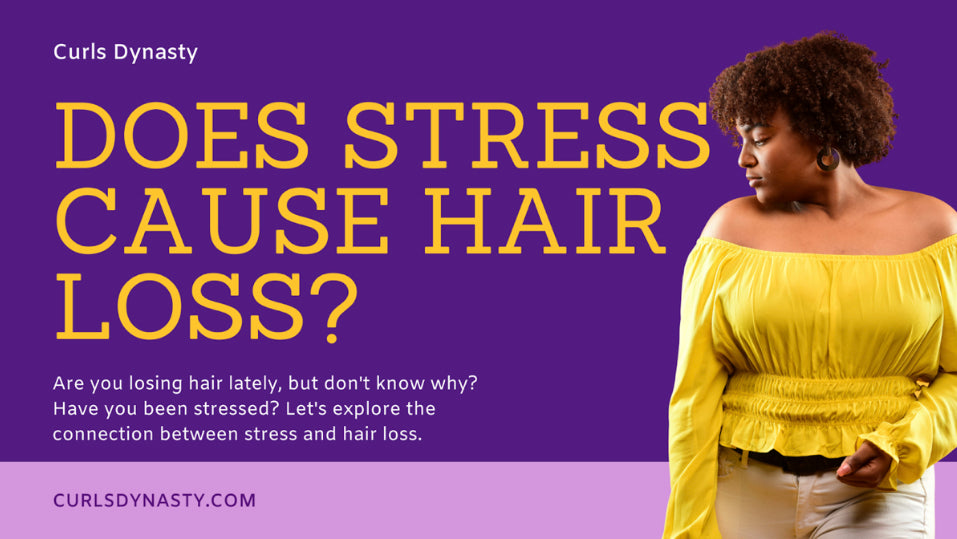Are you losing hair lately, but don't know why? Have you been stressed? Let's explore the connection between stress and hair loss.
Our hair changes in texture, length, and thickness throughout our lives. And with time, some of us could start to lose hair. There are many reasons why someone could be losing their hair. For example, poor diet, genetics, medical conditions, etc. But did you know that researchers found a link between stress and hair loss?
Stress and Hair Loss
Let’s discuss several ways that stress can cause hair loss.
Telogen Effluvium
On average, there are approximately 100,000 hair follicles on the scalp of an adult. The hair follicles are constantly cycling between growth and resting phases. Most hair follicles are usually in the growth (anagen) phase at any given time. But, it is possible that if someone undergoes significant emotional distress for an extended period of time, more of the follicles than usual could enter the resting (telogen) phase. When a hair follicle enters the telogen phase, it usually falls out soon after (usually, you will notice the hair loss about 3 months after the stressor, since this is the amount of time it typically takes to complete a hair growth cycle). So, it is possible that stress can cause a person to experience noticeable or significant hair loss. This form of stress-related hair loss is called telogen effluvium.
The good news is that most of the time, hair loss due to telogen effluvium is only temporary. Once the person’s stress eases, the hair follicles could return to the anagen phase, and the hair should slowly grow back. But this isn’t the case with everyone who has lost hair.
Some people’s telogen effluvium can be chronic. Or there could be other factors - such as age, genetics, or other medical conditions - that might be causing more permanent hair loss. If you are experiencing more hair loss than usual, or notice that your hair is thinning, consult with your doctor.
Alopecia Areata
Described as an autoimmune disorder that causes hair to fall out, alopecia areata could possibly be triggered by stress. This disorder causes your immune system to attack your hair follicles, resulting in clumps of hair (about the size of a quarter) on your head and body to fall out. The cause of alopecia areata is unknown. But some doctors and researchers believe that individuals who have this disorder carry it in their genes, and then something in their bodies (like stress) triggers their immune system to attack the hair follicles.
People with certain medical and genetic conditions are more likely to develop alopecia areata. Some grow their hair back for good, some don’t grow their hair back at all, and some go through periods of hair loss and growth throughout their lives. The best way to treat it is to see a doctor.
Trichotillomania
Characterized by an irresistible urge to pull out hair from the scalp, eyelashes, eyebrows, and/or body. Trichotillomania is a mental disorder that affects about five in 10 million people in the United States. Many people with trichotillomania develop it at the age of 12, with 75% of cases being female.
Hair pulling is thought to be a way of coping with negative or stressful emotions - such as loneliness, anxiety, boredom, sadness, tension, and frustration. Often, the hair-pulling feels satisfying, or like a relief from building emotional tension. And those who pull hair from the scalp can appear to have thinning hair or patchy bald spots. People affected with this condition sometimes go to great lengths to hide it, and might feel ashamed or embarrassed by their hair loss. Some people will eat the hair they’ve pulled out, which can cause serious medical conditions.
In most cases, trichotillomania is chronic, and can come and go throughout a person’s life. It can only be treated by consistent care from a mental health and/or medical professional.
What to Do About Stress and Hair Loss
First thing’s first, seek help and treatment from a medical and/or mental health professional. In addition to any medical or mental health treatments, you can try the following stress-relief techniques to help kick your follicles back into their growth phase:
-
Meditation
-
Exercise
-
Aromatherapy
-
Breathing exercises
-
Visualization
-
Progressive muscle relaxation
-
Yoga
-
Cranial and body massage
-
Art therapy
-
Music therapy
If your hair care treatment allows, and you’re looking to integrate quality products into your hair care regimen, Curls Dynasty’s got you covered. Our products are made from natural ingredients to get your hair healthy and growing. Click here to check out our Moisture and Growth Collection.

